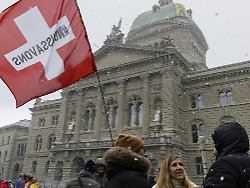Sunday, November 28th, 2021
Protests against popular vote
Swiss want to keep 3G certificate
Referendums are part of Switzerland’s political culture. However, this could also have long-term effects: the Swiss are voting on the 3G certificate. Opponents of the measure go to the barricades. The mood is increasingly violent.
In the midst of a new wave of corona, a clear majority of the Swiss supported the government’s Covid-19 law in a referendum. According to projections by the GFS Bern institute, 63 percent of those eligible to vote voted for the law, which is intended to create a legally secure basis for the controversial Covid-19 certificate. In anticipation of renewed protests, the police increased security in front of the parliament and government seat in Bern.
The already introduced Covid-19 certificate has been bitterly disputed in Switzerland for months. The certificate is required, with which a corona vaccination, recovery or negative test can be proven, since September, among other things, when visiting restaurants.
Opponents of vaccination regard the law as “discriminatory”. Representatives of the organization “Verfassungsfreunde”, which initiated the referendum, even denounced the threat of “health apartheid” in connection with the certificate. The Covid-19 certificate particularly violates Article 10 of the Swiss constitution, said “Verfassungsfreunde” spokeswoman Michelle Cailler. From their point of view, the certificate is nothing more than a “camouflaged compulsory vaccination”.
The heated debate about the government’s corona policy has resulted in protests, sometimes violent, by so-called freedom trysts, in which the police sometimes used tear gas and rubber bullets. According to the police, threats of violence and death against politicians who advocate stricter corona measures also increased dramatically. Health Minister Alain Berset, among others, is under police protection.
Effects on Political Culture
Even after the clear result of the vote, observers expected further protests. The police erected a protective fence in front of the Federal Palace in Bern. Isolated demonstrators gathered there shortly after the polling stations closed on Sunday lunchtime. The irreconcilability with which supporters and opponents of the corona measures face each other in Switzerland is extremely unusual for the Alpine country. The direct democratic system in Switzerland is actually based on consensus; debates are traditionally conducted in an atmosphere of mutual respect.
Experts fear, however, that the division in society over the corona policy could have long-term effects on political culture in Switzerland. “Switzerland has become a country like any other,” said Geneva political scientist Pascal Sciarini. “It’s no longer a consensus area, we still want to believe it.” From Sciarini’s point of view, the right-wing populist SVP is also responsible for the polarization. It is the only party in Switzerland that does not support the Covid-19 law. Several party leaders, including Finance Minister Ueli Maurer, have shown themselves in the past few months with the shirts that are typical of the “Freedom Tryps” – in order, as Sciarini suspects, to make political capital out of the heated debate.
Just like other countries, Switzerland has been experiencing an increase in the corona numbers since mid-October. With around 67 percent fully vaccinated, the Alpine country also has a lower vaccination rate than other Western European countries. According to a survey published in the newspaper “Sonntagsblick”, 53 percent of the Swiss would support compulsory vaccination.
